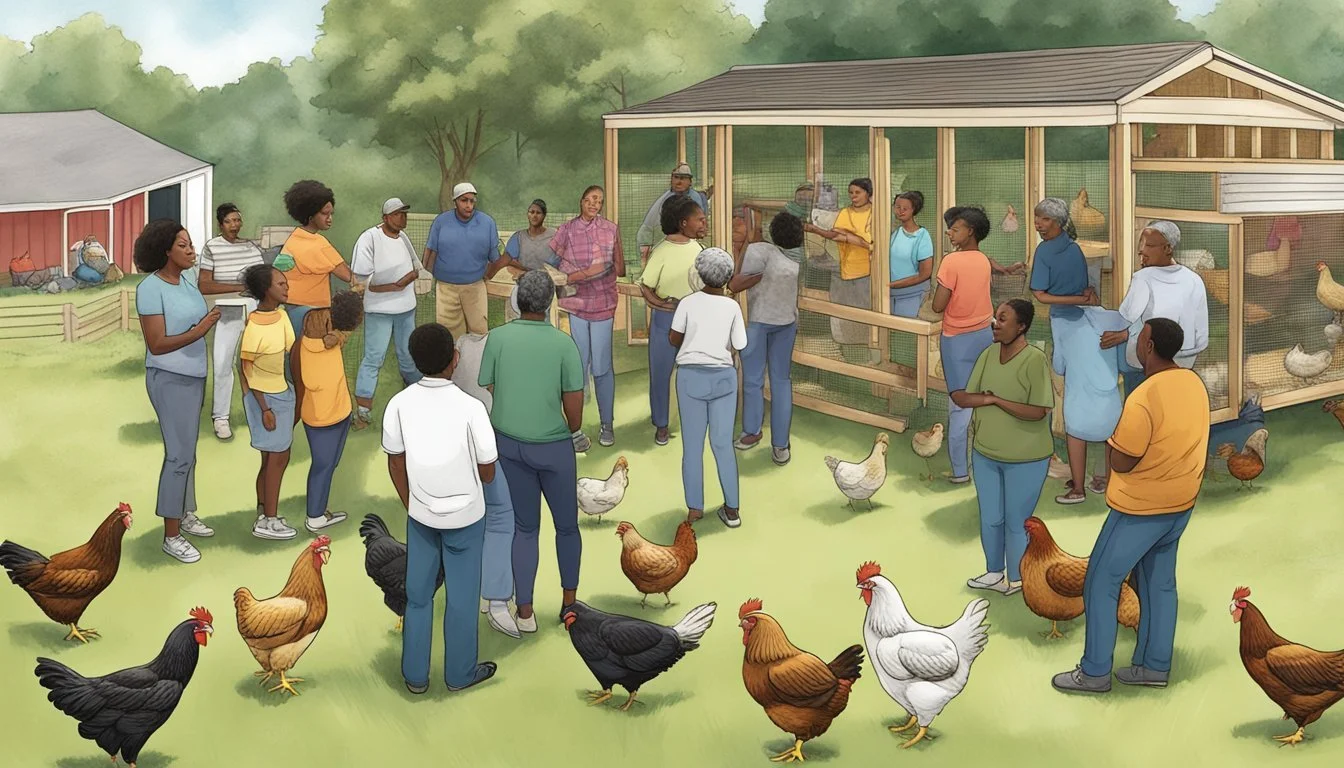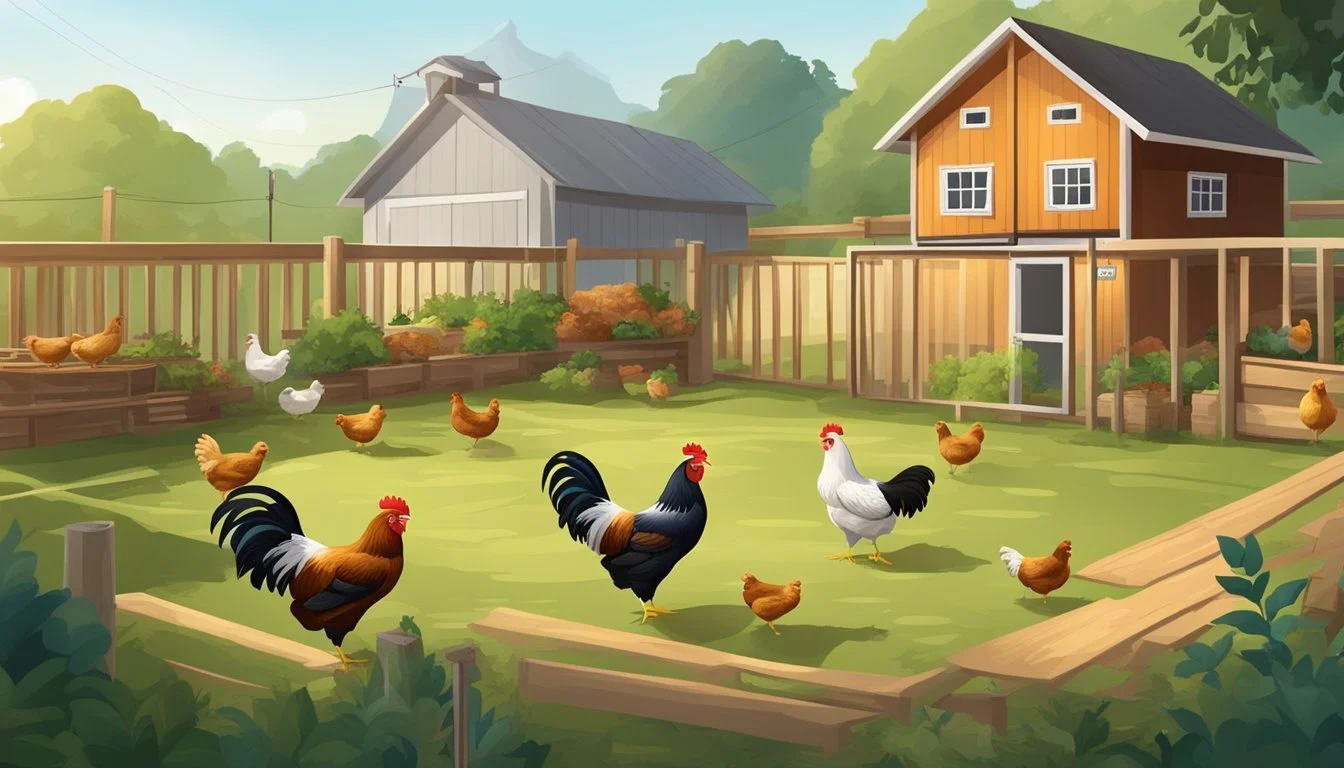Keeping Backyard Chickens in Clarksville, TN
Essential Tips for Novice Poultry Keepers
Raising backyard chickens is a growing trend among residents in Clarksville, Tennessee. The city’s regulations create a friendly environment for individuals interested in keeping hens for eggs, pest control, and as pets. In Clarksville, the law permits the keeping of domesticated hens in various residentially zoned districts. The process for establishing a backyard coop is straightforward, encouraging residents to partake in this sustainable practice.
The city of Clarksville has established specific guidelines to ensure the welfare of the chickens and to address any concerns neighbors might have. For example, structures meant exclusively for livestock must be situated at least 200 feet from the property line. Additionally, Clarksville’s codes allow for the keeping of hens in districts zoned E-1, R-1, R-1A, R-2, and R-2A, recognizing that these animals are an important part of an urban homestead.
While the city accommodates backyard chickens, it restricts the keeping of roosters and prohibits on-site slaughtering to maintain neighborhood peace and public safety. These regulations reflect a balance between the interests of chicken enthusiasts and the broader community, ensuring that the practice of keeping chickens is both enjoyable and neighborly.
Understanding Local Chicken Ordinances
In Clarksville, Tennessee, keeping backyard chickens is subject to specific local ordinances and zoning requirements. Homeowners must navigate the permit process and adhere to regulatory guidelines to ensure compliance.
Clarksville Zoning Requirements
Zoning Designations: Homeowners are allowed to keep up to eight domesticated hens on properties sized at least 9,000 square feet within the following residentially zoned districts:
E-1
R-1
R-1A
R-2
R-2A
Proximity to Property Line: No structures exclusively for livestock, such as chicken coops, may be situated closer than 200 feet from the property line.
Prohibited Fowl: Roosters and other poultry types, including ducks, turkeys, and geese, are not allowed within city limits.
Montgomery County Regulations
Safety and Welfare: Regulations ensure the safety of the animals, the sanitation of the premises, and the non-impairment of surrounding property enjoyment. Homeowners must maintain a clean and orderly space for their chickens to satisfy these conditions.
Breeding and Slaughtering: The breeding or slaughtering of chickens on residential properties is prohibited in the city of Clarksville.
Permitting Process for Backyard Chickens
Permit Required: Obtaining a permit is an essential step. Residents must contact the Department of Building and Codes to start the application process for the required permits:
Contact Information:
Director: Les Crocker
Address: 100 South Spring Street, Clarksville, TN 37040
Phone: (931) 645-7426
Fax: (931) 645-7430
Email: [email protected]
Application Details: Homeowners should be prepared to provide details about their property and the intended chicken coop location respecting the 200-foot property line rule. The department will outline other necessary requirements to secure a permit for keeping backyard chickens.
Setting Up Your Chicken Coop
Setting up a chicken coop in Clarksville, TN requires attention to design, placement, and compliance with local building codes. Properly designing your coop and enclosure ensures the well-being of your chickens and adherence to regulations.
Coop Design and Size Recommendations
When designing a chicken coop, consider both the coop and run (chicken enclosure) space requirements. The coop should provide at least 2 square feet per chicken, ensuring adequate space to roost and move comfortably, but should not exceed 50 square feet in total. Bedding such as straw or wood shavings should be used to maintain cleanliness and comfort.
Minimum coop space: 2 square feet per chicken
Coop material: Durable, weatherproof materials such as wood or metal
Bedding: Straw or wood shavings recommended
Placement and Property Considerations
Clarksville regulations require that any structure exclusively for livestock, including chicken coops, must be no closer than 200 feet from the property line. Placing your coop at the rear of the property can help comply with this rule. The overall chicken enclosure must provide at least 6 square feet per bird.
Distance from property line: At least 200 feet
Placement: Preferably at the rear of the property
Enclosure sizing: Minimum of 6 square feet per bird
Building and Codes Compliance
The chicken coop, along with the run, must meet certain building and codes compliance criteria. The structure must be built outside of any habitable structure and enclosed with proper fencing to protect the chickens from predators. Additionally, the maximum height of the chicken coop should comply with local zoning regulations.
Zoning compliance: Adhere to local zoning requirements for livestock structures
Construction standards: Durable construction, predator-proof fencing
Height restrictions: Check local zoning for maximum height allowances
Raising Healthy Chickens
In Clarksville, Tennessee, ensuring the health of backyard chickens involves focused attention on diet and preventive care. These aspects are vital to raising robust hens, as the town's regulations do not permit roosters and emphasize the welfare of domesticated hens.
Feeding and Nutrition
Chickens require a well-balanced diet to thrive. A chicken's feed should be rich in proteins, vitamins, and minerals. A standard nutrition guide for backyard chickens would include:
Starter Feed: High protein (around 22-24%) content for the first 6 weeks.
Grower Feed: Slightly reduced protein (around 16-18%) until they start to lay eggs.
Layer Feed: Around 16% protein but with increased calcium to support eggshell formation.
Additionally, access to a variety of insects and greens can supplement their diet. It's important to provide grit, which aids in digestion, and ensure that fresh water is available at all times.
Health Care and Maintenance
Preventive care is key to maintaining the well-being of backyard hens. Routine checks for parasites and vaccination against common diseases are essential practices. Some essential health care practices include:
Vaccinations: Follow a vaccination schedule as recommended by a local veterinarian.
Parasite Control: Routinely check for lice, mites, and internal worms.
Providing a clean, dry, and safe coop is also crucial for disease prevention. Keep the coop well-ventilated and spacious enough to prevent overcrowding, which can lead to stress and illness. coop cleanliness contributes to deterring vermin and maintaining good respiratory health in chickens.
Community Engagement and Resources
In Clarksville, TN, the raising of backyard chickens is supported by a vibrant community network and educational resources. Residents can connect with local farmers and tap into educational opportunities for better poultry management.
Connecting with Local Farmers
Local farms offer Clarksville residents invaluable insights into the best practices for raising backyard chickens. Individuals interested in starting their own coop can:
Visit local farms to observe and learn directly from experienced farmers.
Utilize Facebook groups like "Clarksville Backyard Chickens" to connect with a community of local poultry enthusiasts for advice and to buy, sell, or trade related items.
Educational Opportunities and Outreach
Clarksville's agriculture community and the city council work in tandem to offer educational resources for aspiring chicken owners:
The city council provides guidelines and codes for the welfare of animals and maintenance of sanitary conditions.
Workshops hosted by agriculture experts or a farm store director offer hands-on tips and training on chicken rearing.
Outreach programs facilitate knowledge sharing on relevant regulations and benefits of backyard poultry as part of the city's initiative to encourage urban agriculture.
Legal and Ethical Considerations
In Clarksville, TN, residents interested in keeping backyard chickens must navigate specific regulations while considering the ethical treatment of the animals.
Understanding Livestock Status
In the city of Clarksville, domesticated hens are classified differently from other livestock. They are permitted in certain residential zones, specifically E-1, R-1, R-1A, R-2, and R-2A, indicating their acceptability in urban settings where traditional livestock may not be allowed. Notably, roosters are prohibited within city limits, a regulation likely in place to mitigate noise concerns and maintain peace within neighborhoods. The city's code enforces a limit on the number of hens allowed, and residents are required to ensure they have adequate space – a property must measure at least 9,000 square feet to host up to eight domesticated hens.
Proper Handling and Care of Domesticated Hens
When it comes to poultry farming, even on a small scale, the welfare of the hens is paramount. Clarksville's regulations mandate the maintenance of sanitary conditions for the health of the hens and public. Ethical considerations include providing adequate shelter, nutrition, and space for the hens to exhibit natural behaviors. Any application to keep domesticated hens must adhere to these standards to ensure the proper handling and care of the animals, thus reflecting the city's commitment to animal welfare. Additionally, the regulations are in place to protect the quality of life in the community, restricting any activities such as breeding or slaughtering on residential premises to prevent discomfort or nuisance to surrounding properties.





